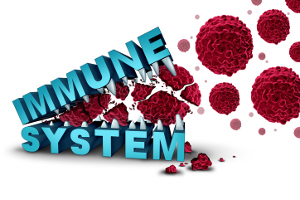The war against COVID-19 requires four nutrients
- which many people lack
 It is not the actual COVID-19 virus that can become lethal. It is the immune system’s overreaction with hyperinflammation and a storm of cytokines that destroys healthy tissue in the lungs, the cardiovascular system, and other places in the body, according to a new article that is published in The Lancet. The capacity of the immune system determines if an infection like COVID-19 is either harmless or life-threatening. For that reason, hygienic measures, masks, isolation, and delayed vaccines are not sufficient. We also need to bolster our immune system against COVID-19 and other pandemics that may occur in the future. Let’s look closer at vitamin C, vitamin D, selenium and zinc, all of which are essential for preventing a well-functioning immune system from going off its rails. What is also worth mentioning is that many people lack these nutrients, especially older people and other exposed groups.
It is not the actual COVID-19 virus that can become lethal. It is the immune system’s overreaction with hyperinflammation and a storm of cytokines that destroys healthy tissue in the lungs, the cardiovascular system, and other places in the body, according to a new article that is published in The Lancet. The capacity of the immune system determines if an infection like COVID-19 is either harmless or life-threatening. For that reason, hygienic measures, masks, isolation, and delayed vaccines are not sufficient. We also need to bolster our immune system against COVID-19 and other pandemics that may occur in the future. Let’s look closer at vitamin C, vitamin D, selenium and zinc, all of which are essential for preventing a well-functioning immune system from going off its rails. What is also worth mentioning is that many people lack these nutrients, especially older people and other exposed groups.
- Created on .








 Folic acid supplements are typically recommended to people with anemia and to expecting mothers. However, folic acid supplements can also be important for the cardiovascular system, the brain and memory, and for preventing stroke. The widespread lack of this nutrient is a result of poor diets, pregnancy, ageing, alcohol abuse, and the consumption of birth control pills and various types of medicine.
Folic acid supplements are typically recommended to people with anemia and to expecting mothers. However, folic acid supplements can also be important for the cardiovascular system, the brain and memory, and for preventing stroke. The widespread lack of this nutrient is a result of poor diets, pregnancy, ageing, alcohol abuse, and the consumption of birth control pills and various types of medicine. Lack of vitamin B12 can cause pernicious anemia, which WHO considers a global threat. Vitamin B12 is primarily known for its role in red blood cell formation, whereas its role in the brain and nervous system is often overlooked. A vitamin B12 deficiency can easily lead to disabling damage if it goes unnoticed. Pernicious anemia is an autoimmune disease that prevents people from absorbing vitamin B12 from food. The condition is potentially life-threatening but is difficult to diagnose and many people go untreated, according to Associate Professor Heidi Seage, who is affiliated with the Pernicious Anaemia Society. A worsening factor is the climate debate that has inspired an increasing number of people to turn to vegetarianism and veganism. Plant-based diets are known to cause vitamin B12 deficiency, and the problem is insidious and therefore not easy to detect. The use of diabetes medication (such as metformin) can also deplete the body’s levels of vitamin B12
Lack of vitamin B12 can cause pernicious anemia, which WHO considers a global threat. Vitamin B12 is primarily known for its role in red blood cell formation, whereas its role in the brain and nervous system is often overlooked. A vitamin B12 deficiency can easily lead to disabling damage if it goes unnoticed. Pernicious anemia is an autoimmune disease that prevents people from absorbing vitamin B12 from food. The condition is potentially life-threatening but is difficult to diagnose and many people go untreated, according to Associate Professor Heidi Seage, who is affiliated with the Pernicious Anaemia Society. A worsening factor is the climate debate that has inspired an increasing number of people to turn to vegetarianism and veganism. Plant-based diets are known to cause vitamin B12 deficiency, and the problem is insidious and therefore not easy to detect. The use of diabetes medication (such as metformin) can also deplete the body’s levels of vitamin B12 PMS (premenstrual syndrome) is quite common among women of childbearing age and can easily make their lives miserable for years, causing both physical and mental discomfort several days a month. A possible cause can be lack of vitamin D, and it looks as if high-dosed supplementation with the nutrient can relieve PMS by controlling inflammation markers and influencing the body’s antioxidant capacity. This was shown in an Iranian study that is published in Scientific Reports. It is worth noting that we need magnesium to activate vitamin D in order for the body to be able to use it optimally.
PMS (premenstrual syndrome) is quite common among women of childbearing age and can easily make their lives miserable for years, causing both physical and mental discomfort several days a month. A possible cause can be lack of vitamin D, and it looks as if high-dosed supplementation with the nutrient can relieve PMS by controlling inflammation markers and influencing the body’s antioxidant capacity. This was shown in an Iranian study that is published in Scientific Reports. It is worth noting that we need magnesium to activate vitamin D in order for the body to be able to use it optimally. Selenium is of vital importance to a strong immune defense. Still, selenium deficiency is a common problem and it increases the risk of viral infections such as influenza and the coronavirus from China, which is feared to turn into a global pandemic. It is a problem that selenium deficiency in infected animals and humans causes the virus to mutate and become more aggressive. Because of selenium’s important role as a powerful antioxidant, being deficient of this micronutrient may leave the body vulnerable to oxidative stress, which can cause tissue damage and complicate the virus infection. It is therefore important to get enough selenium at all times, as it also increases our resistance towards other viral infections such as herpes, HIV, and hepatitis, according to an article published in Nutrients.
Selenium is of vital importance to a strong immune defense. Still, selenium deficiency is a common problem and it increases the risk of viral infections such as influenza and the coronavirus from China, which is feared to turn into a global pandemic. It is a problem that selenium deficiency in infected animals and humans causes the virus to mutate and become more aggressive. Because of selenium’s important role as a powerful antioxidant, being deficient of this micronutrient may leave the body vulnerable to oxidative stress, which can cause tissue damage and complicate the virus infection. It is therefore important to get enough selenium at all times, as it also increases our resistance towards other viral infections such as herpes, HIV, and hepatitis, according to an article published in Nutrients. It is hardly a coincidence that sore throats, colds, flus, and related complications such as sinus infections and pneumonia typically circulate during the winter period. They are primarily a result of having low vitamin D levels. During the winter, the sun sits too low in the sky to enable vitamin D synthesis in our skin, and we only have a limited amount of the nutrient stored in the liver. Good hand hygiene, warm soup, garlic, echinacea and other immune-boosting herbs alone will not deal with the problem, as they can never compensate for our lack of essential vitamin D, which the white blood cells of our immune system need in order to silently kill of virus. But how much vitamin D do we need, is it possible to get too much, and which mineral is necessary for activating the vitamin?
It is hardly a coincidence that sore throats, colds, flus, and related complications such as sinus infections and pneumonia typically circulate during the winter period. They are primarily a result of having low vitamin D levels. During the winter, the sun sits too low in the sky to enable vitamin D synthesis in our skin, and we only have a limited amount of the nutrient stored in the liver. Good hand hygiene, warm soup, garlic, echinacea and other immune-boosting herbs alone will not deal with the problem, as they can never compensate for our lack of essential vitamin D, which the white blood cells of our immune system need in order to silently kill of virus. But how much vitamin D do we need, is it possible to get too much, and which mineral is necessary for activating the vitamin? The coronavirus has spread from Wuhan in China to a number of continents, where it has caused massive fear and affected daily life and the global economy. Although most people that get the infection experience a mild course of events, the greatest fear is the potentially life-threatening complications in the respiratory system caused by oxidative stress, which have already taken thousands of human lives. Chinese scientists now call for early intravenous therapy with large doses of vitamin C to prevent oxidative stress and the life-threatening complications that follow in the wake of a derailed immune system. Many researchers also claim that higher intake of vitamin C from dietary sources or supplements help prevent by boosting and regulating the immune system in the upper respiratory tract. The same goes for vitamin D and selenium.
The coronavirus has spread from Wuhan in China to a number of continents, where it has caused massive fear and affected daily life and the global economy. Although most people that get the infection experience a mild course of events, the greatest fear is the potentially life-threatening complications in the respiratory system caused by oxidative stress, which have already taken thousands of human lives. Chinese scientists now call for early intravenous therapy with large doses of vitamin C to prevent oxidative stress and the life-threatening complications that follow in the wake of a derailed immune system. Many researchers also claim that higher intake of vitamin C from dietary sources or supplements help prevent by boosting and regulating the immune system in the upper respiratory tract. The same goes for vitamin D and selenium. Depression is on the rise. The problem is often caused by inflammation in the brain. The British neuro-immunologist, Edvard Bullmore, has published the thought-provoking book called The Inflamed Mind, in which he describes the link between root canal treatment and depression, among other things. David Perlmutter, a neurologist, has written the book, Grain Brain, where he describes how gluten combined with carbohydrate overload also can cause inflammation in the brain. Depression, in other words, may occur when the blood-brain barrier is not as impermeable as assumed, and when the cytokines of the immune defense are able to cause undesirable brain inflammation. Numerous studies have shown that fish oil, vitamin D, magnesium, zinc, and selenium can improve a person’s mood by counteracting inflammation in the brain and other sites, and there is often a connection. It requires therapeutic doses, however, and it is vital that the supplements have good bioavailability, so the active substances reach the cells.
Depression is on the rise. The problem is often caused by inflammation in the brain. The British neuro-immunologist, Edvard Bullmore, has published the thought-provoking book called The Inflamed Mind, in which he describes the link between root canal treatment and depression, among other things. David Perlmutter, a neurologist, has written the book, Grain Brain, where he describes how gluten combined with carbohydrate overload also can cause inflammation in the brain. Depression, in other words, may occur when the blood-brain barrier is not as impermeable as assumed, and when the cytokines of the immune defense are able to cause undesirable brain inflammation. Numerous studies have shown that fish oil, vitamin D, magnesium, zinc, and selenium can improve a person’s mood by counteracting inflammation in the brain and other sites, and there is often a connection. It requires therapeutic doses, however, and it is vital that the supplements have good bioavailability, so the active substances reach the cells. High-dosed supplementation with coenzyme Q10 is able to reduce the frequency, severity, and duration of migraine attacks, which is because the compound reduces levels of a brain peptide that causes pain and inflammation. This was shown in a groundbreaking study that is published in Nutritional Neuroscience. Pharmaceutical companies are now working around the clock to develop a patentable drug that is able to block this peptide, but migraine sufferers may just as well use Q10. It is already available without a prescription. Always choose a high-quality product with documented bioavailability to ensure that the Q10 molecules reach the energy-producing mitochondria of the cells. The reason why migraine sufferers may have an increased need for coenzyme Q10 is that they have mitochondrial defects.
High-dosed supplementation with coenzyme Q10 is able to reduce the frequency, severity, and duration of migraine attacks, which is because the compound reduces levels of a brain peptide that causes pain and inflammation. This was shown in a groundbreaking study that is published in Nutritional Neuroscience. Pharmaceutical companies are now working around the clock to develop a patentable drug that is able to block this peptide, but migraine sufferers may just as well use Q10. It is already available without a prescription. Always choose a high-quality product with documented bioavailability to ensure that the Q10 molecules reach the energy-producing mitochondria of the cells. The reason why migraine sufferers may have an increased need for coenzyme Q10 is that they have mitochondrial defects.